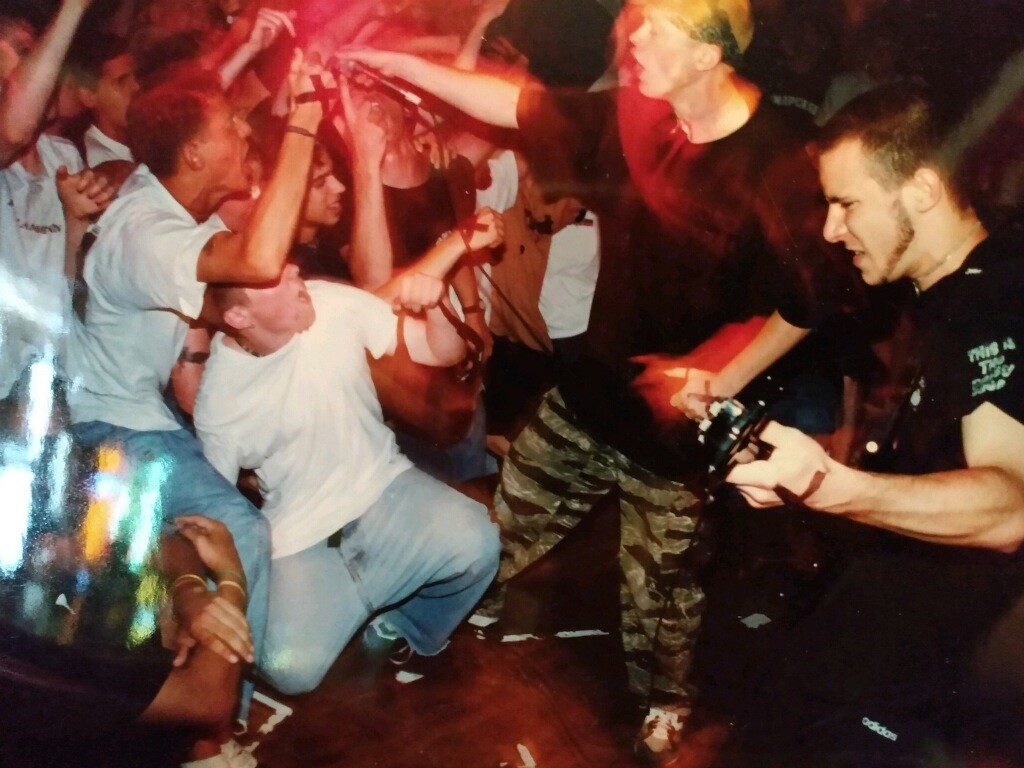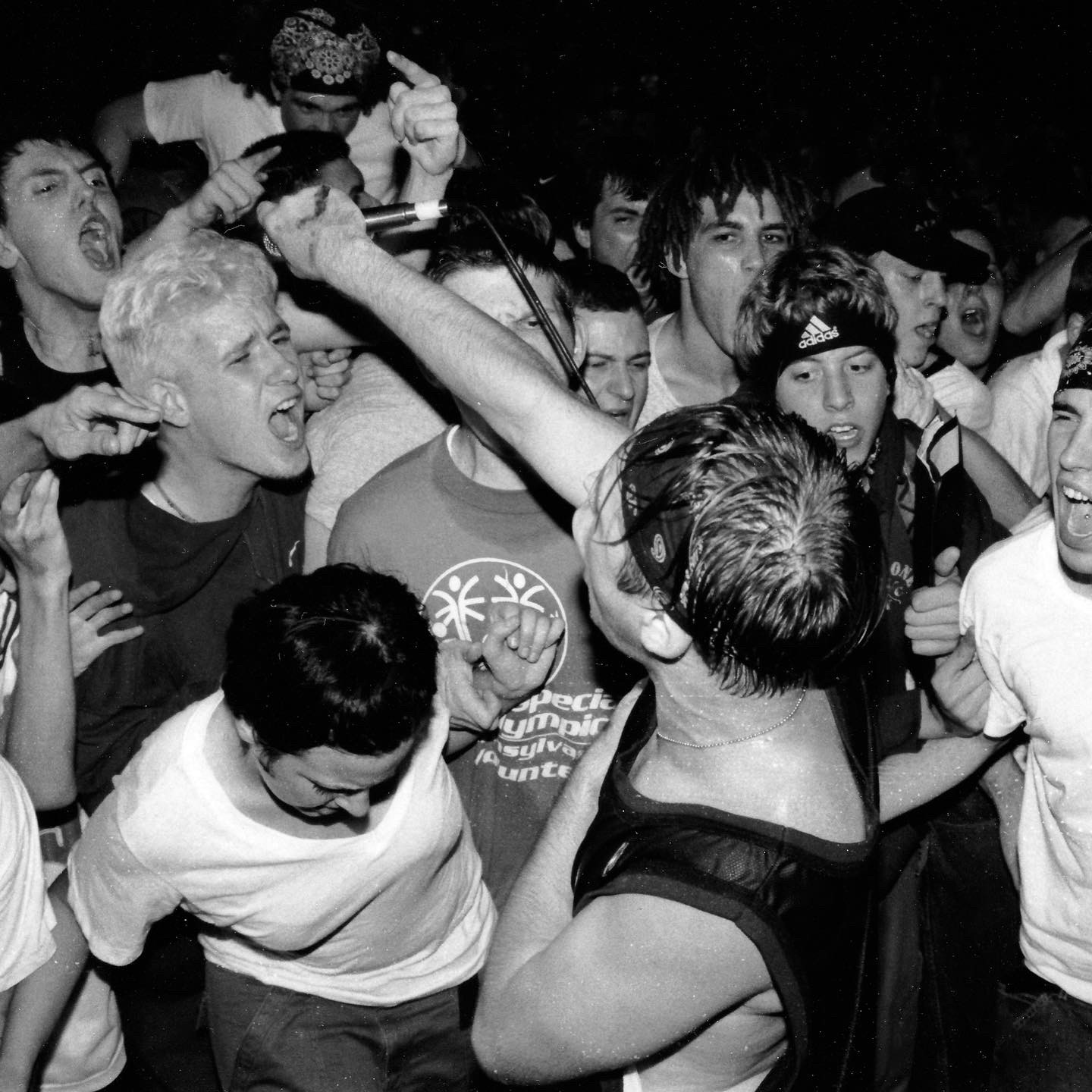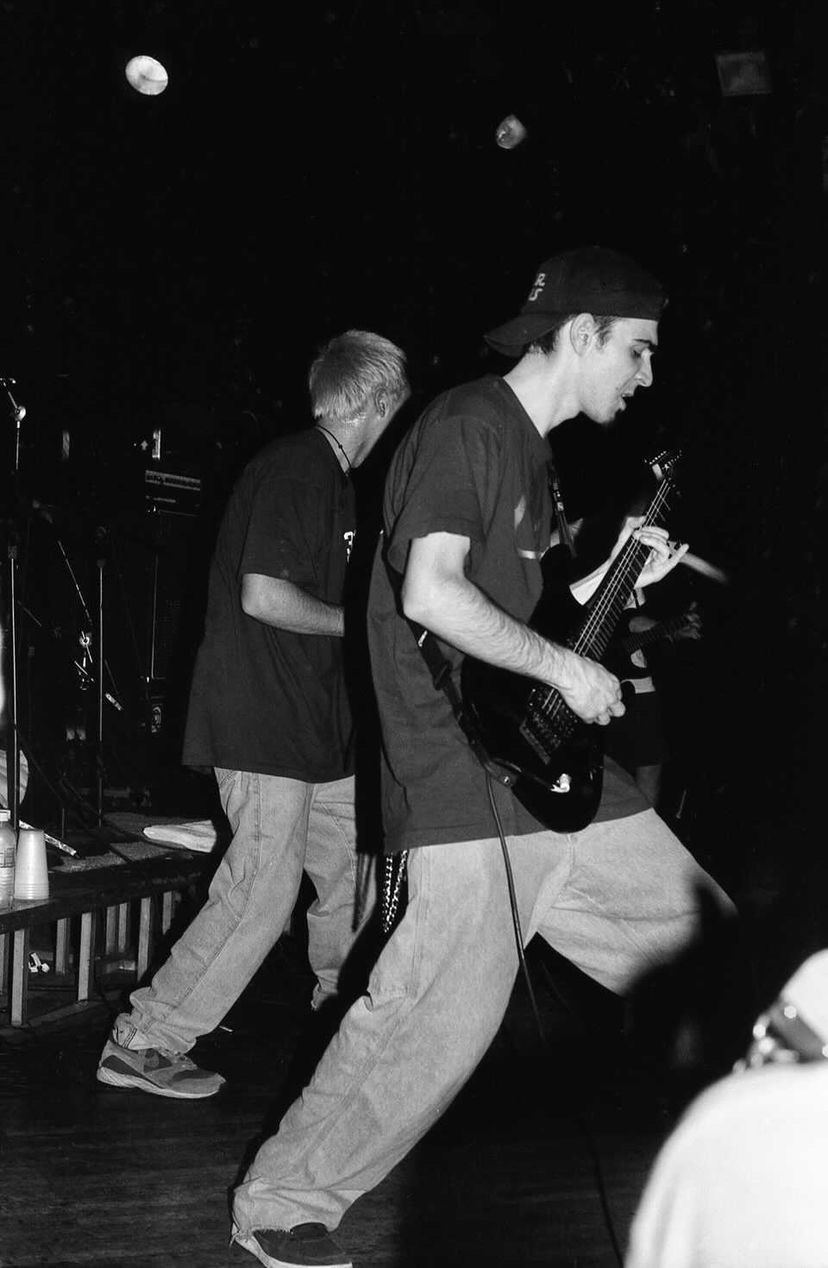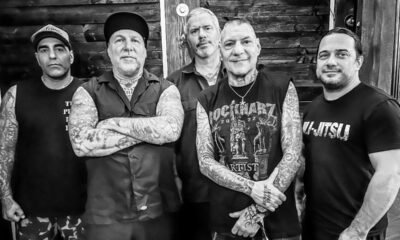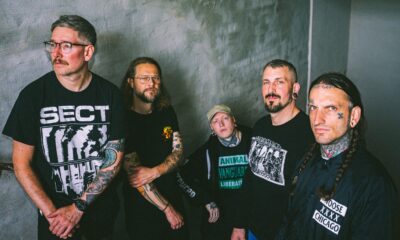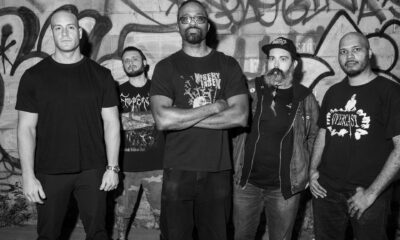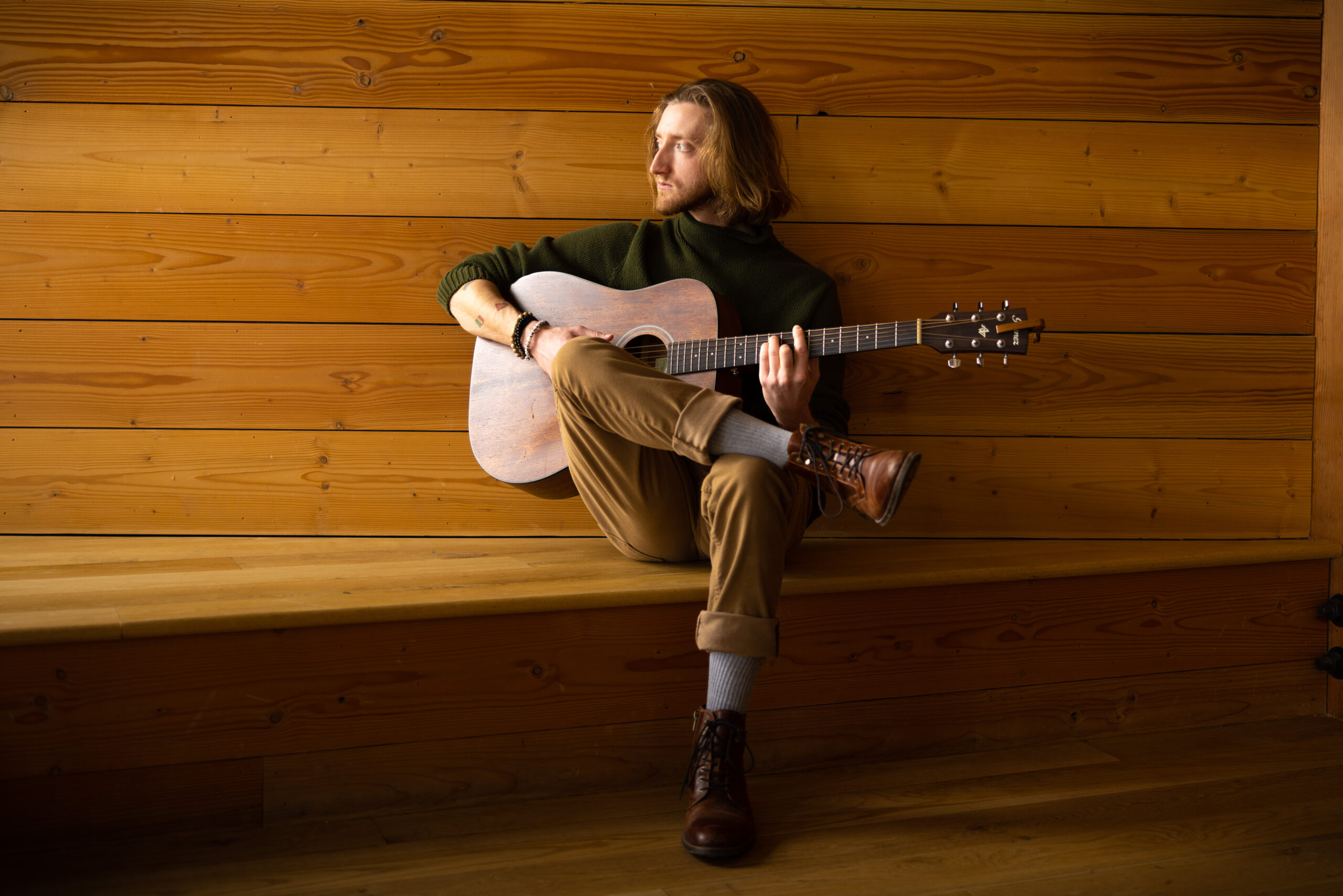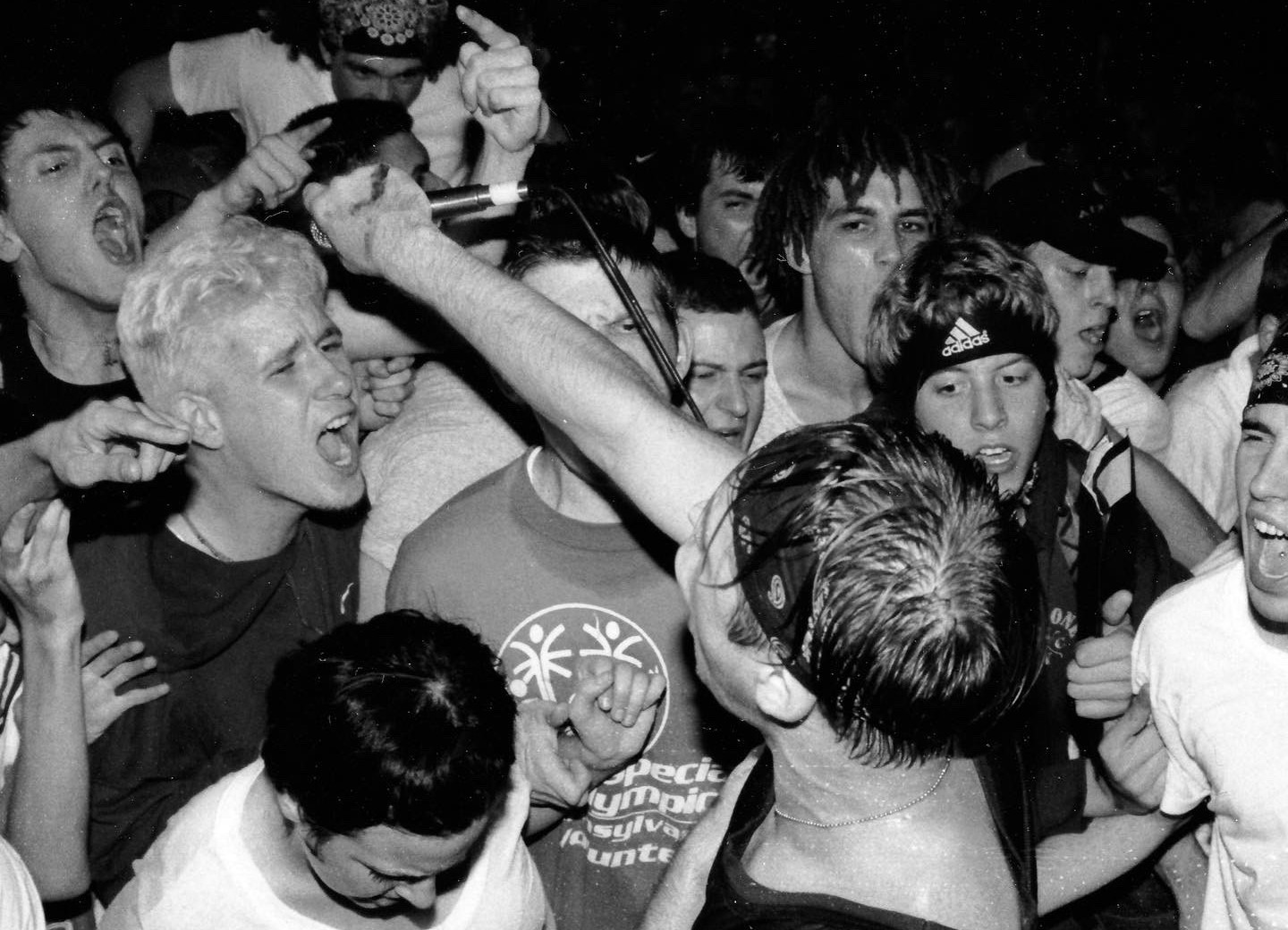

Hardcore/Punk
Earth Crisis: “People really take the bait when it comes to the divide and conquer propaganda.”
To mark the 30th anniversary of their groundbreaking EP ‘Firestorm,’ Earth Crisis’ Karl Buechner delves into the significance of straight-edge vegan unity within the hardcore punk community and its enduring relevance today.
It’s June 1993. The LA riots and the siege on Ruby Ridge blazed through headlines a year ago. Repairs are still being carried out on the World Trade Center bombing. The ground is still warm in Waco. The world’s players are clamouring for a seat at the table following the collapse of the Soviet Union.
You could be forgiven for thinking the only logical next step would be complete societal collapse.
That feeling beats down citizens like record heat waves, extending past the day dwellers, reaching into dark alleys in New York’s underworld. Deep underground in the hardcore punk world, there is that a force is about to emerge. It’s an anthem, one that will leave an indelible mark on the music landscape, one that will decry the rampant wildfires of madness and blasphemy and insanity.
It’s an EP, barely 15 minutes long. Emblazoned over tendrils of flame are the band’s logo, and the title of said release: Firestorm. It’s a small offering from an unknown band, only their second release together, and the first one with their new label, a relatively new imprint called Victory Records. It’s a compact disc with a jewel case and liner notes, but it may as well be a molotov cocktail for all the incendiary carnage, both sonically and socially, that it’s about to unleash.
It’s June, 2023. It’s been 30 years since that EP was released. And I’m about to sit down with Karl Buechner, the band’s founder and frontman, to discuss that seminal work, what it meant to make it, and what it means today. All of this is front of mind as Karl is getting set up. His Apocalypse Tribe bandmate Eric Bukowski‘s setup is being used for this online meeting. I absently think of how many bones have been broken to the monstrous opening of that infamous title track. A familiar clutch in my gut emerges as we’re about to start the interview.
In the scorching summer of 1993, Earth Crisis unleashed Firestorm on a world that was ill-prepared for its ferocity. From the opening salvo of the title track, a blistering assault on societal complacency, to the bone-crushing breakdowns and razor-sharp lyrics that permeated every track, Firestorm became a rallying cry for disenchanted youth everywhere. Its venomous blend of metallic hardcore and militant lyrics struck a nerve, igniting a maelstrom of dissent that swept through the hardcore punk community.
I was only 5 when that record came out. It would be another 10 before I learned about that scene, and another 5 before I learned the crushing power it was capable of firsthand.
Earth Crisis was originally formed by Karl Buechner and DJ Rose in 1989, along with further members all composed of skateboarding associates. While the original lineup fizzled out, Buechner continued to compose tracks, eventually taking over lyrical and vocal duties, patiently assembling a group of like-minded bandmates, until they finally reached the lineup that would play on Firestorm. In addition to a dedication to their craft and playing music, each member crucially possessed an unwavering commitment to the straight-edge vegan lifestyle.
Their resulting influence on the hardcore punk community was cataclysmic. Firestorm served as a sonic manifesto, urging a generation of hardcore punks to embrace their anger, channel their frustration, and unite for a common purpose. Earth Crisis became the architects of a movement, inspiring countless bands to push the boundaries of the genre, infusing it with a newfound sense of urgency and purpose. Their uncompromising stance on animal rights, environmentalism, and straight-edge ethics reverberated throughout hardcore and became a catalyst for burgeoning hordes of like-minded kids to become adherents to a different type of faith.
I think of a phrase a history prof of mine espoused: “You cannot stop an idea whose time has come.” I think of Karl being given a choice in 1993, between academia and music. On the one hand was the prospect of a lifetime of security and reputable research and lecturing to classrooms. The other was a hard life on the road, playing basements and lodges, living hand-to-mouth and bellowing to audiences. I think of what hardcore might have lost (and what academia might have gained).
As the years passed, Earth Crisis’ influence extended far beyond the hardcore punk scene. Their relentless aggression and unwavering dedication to their principles became a touchstone for a multitude of genres. Their fusion of metallic hardcore and thrash metal carved a path that countless bands would follow, shaping the landscape of heavy music for years to come.
What follows is the full conversation between me and Karl. It’s a wide-ranging conversation, pockmarked by the odd bit of technical difficulty, but it’s an otherwise heady and insightful interview. Karl’s answers were carefully considered and covered the full breadth of jovial in tone to barely contained wrath. Just as controversial and opinionated as one could expect when sitting down with one of hardcore punk’s most outspoken lyricists all these years later, you can see the full video of our interview and transcript in full below, precisely because his answers were so considered and incendiary.
Find the band online, here: https://www.instagram.com/earthcrisisofficial.
Thanks so much for speaking with me today. And in particular, this is a really big year for the anniversary of, I know, at least for me, it’s one of the most formative albums. And I just wanted to ask to start off with: Firestorm is often regarded as a seminal album. Can you share some insights on how this album came together and what it meant to you personally and for the band’s message at that time?
Karl Buechner: “It’s pretty much the record that put our band on the map, and I think it set the tone for everything that followed when it came to how we wrote our songs, how we carried ourselves, and the messages that we were forwarding.
“So for me, it was a huge victory cause it had taken me from age 18 to age 21 to get a lineup together where everyone was vegan, straight edge, everyone was a capable musician and composer and have the tenacity to be able to carry those ideals and, you know, stand their ground.”
And that’s a huge theme in that, is that standing your ground. How much more important is it to stand your ground nowadays?
“Well, I, I think the big difference between 1990s and now, are normalization of drugs. Some doctors that the major pharmaceutical corporations are essentially pushing on the public and what the drug cartels are involved in. I think back then people wanted a war against the cartels that our government wasn’t willing to wage, you know? It was a slogan, but they weren’t really willing to go in and do what was necessary to stop the flow.
“And in other countries, I mean I’ve been in other parts of the world where the drug plague is handled much differently. And it, it’s not, it doesn’t have the kind of effect on society that it does here when the fire’s essentially allowed to burn, you know, there’s more at it. There’s more crime that follows up.
There’s more chaos in the streets that accompanies it.
“And we see that here. We see that in L.A., we see it in Portland and Seattle and these other cities when we play. And I realize a lot of it has to do with the mercilessness of capitalism. You know, it breaks people. And a lot of it has to do with untreated mental illness and people who have experience with the drug cartels and the people that work for them. I think they’re doing the devil’s work on earth. And it’s the same thing with the major pharmaceutical companies. What drug use is so widespread now that it, it literally is normalized. One of my friends was a teacher and he asked me to come and speak to his class, and one of his colleagues was offended that I was going to be in their school because she thought that I was judgmental.
“‘Oh, well, is he against marijuana use? Blah, blah, blah, blah, blah,’ all this other stuff. And I thought that that was pretty sad. But I also think that it was very telling and probably kind of a standard issue, issue viewpoint, you know what I mean? I do. So I wasn’t, I wasn’t even gonna go in there and talk about vegan straight edge itself.
“I was just gonna talk about the the carnage that’s involved with the drug cartels in Mexico and Columbia and in other parts of the world. You know how it’s literally destabilized regions of those nations. Judges with their throats cut and their families slaughtered. Police you know, shot in the broad daylight in their patrol cars or their families victimized.
“So because the fire has been allowed to burn, this is where we are. I think things are much, much worse than they were in the eighties or nineties. And the, and the pharmaceutical companies have done an incredible job of convincing the public that they have this disorder or that disorder and they need these prescription medications.
“And a lot of ’em are, I mean, are honestly no, that no different than meth. They burn people’s brains out.”
Yeah. And, and with respect to that, and to join on to what you’re saying, I think that you pointed to something that was it, it’s a component of capitalism… you’re pointing out that if you incentivize somebody to make money off of this thing that does not advantage someone, then it’s fair to say that that’s the key, the root cause of the issue. Is that fair to say?
“Yes, it is not advantageous. It is absolutely detrimental. It will set them back because if you are feeling anxious or angry or frustrated or upset, those feelings are there to motivate you to get out of whatever situation you’re in. And narcotizing oneself and numbing one’s self to try and escape from those feelings, I think will only compound a problem.
“And one of the things that we predicted with Firestorm and with the lyrics, I, I think, was that eventually there will be people’s uprisings against the drug plague, against the people that are bringing it into their communities. And in a lot of instances, there’s corrupt police involved and there’s street gangs that are doing the bidding of the cartels.
“And, and I understand the, the crisis that is poverty and the mental illness and the frustration that is a component of that that drives people to risk imprisonment or to risk themselves being shot over a, a lucrative corner. I understand all that stuff and I understood it then because I grew up in the city, I did not grow up in the suburbs and for me- it actually turned out to be kind of common.
“I, I saw it happen with a lot of my friends. They were into skateboarding or motorcycles and they, you know, were kind of adrenaline junkies and I would say a solid half of the guys that I grew up with always used drugs. They always drank, they always got high. But they were our friends. They were part of our group when they started to get a little older. Some of them started getting involved in the drug trade itself, and they were in Europe and they were moving drugs around on trains.
“They were basically smuggling and I thought, I, I never wanna be a part of this. Write this song. I’ll never be a part of it.”
And that opting out from that entire system, that has to feel like it, it, it, it allows kids agency. Did you, could you see a little bit down the road and see the impact that that was gonna start to have and start to influence kids to like see the, the perspective that you were trying to talk about?“Well, here’s the thing: I tried to start Earth Crisis when I was 18, and it took a couple years of finding the right people who shared the same views and were proficient enough with their instruments.
“Who could compose the kind of music that, that I wanted to write with me. And through a miracle, I found Scott, and then Ian and Dennis, and finally Eric. And they had some similar experiences to mine growing up. So we really locked together, you know, ideologically and, and musically. Mm-hmm. And seeing, seeing the band as, you know, not a pastime or a hobby, but as a mission, it really snapped into focus right around then. And we thought, you know, we are very obnoxious, very disorganized skater kids from the hardcore scene.
“But this, this band and this message is, is more important than just something to entertain each other and our friends. Like, this is something we need to carry forward and take seriously. So we, we did – we saw ourselves as that, as ambassadors of an idea. And, and in many ways we hoped that vegan straight edge would become a movement and there would be bands in every city.
“Or people doing zines or documentary films or writing poems or doing paintings, you know, we wanted it to incite more art.”
In retrospect, did it go as far as you wanted it to?
“In some ways, yeah. I think so. I mean, there’s vegan straight bands all over the earth now, and it’s gone on for well over 30 years, so. It’s here to stay. And we, and we know people that have sailed with the Sea Shepherds or have been involved with an Animal Liberation Front-style direct action. We know people that have in their own ways fought back against the drug plague.
“Also have friends that grew up to be police or doctors and nurses. So it is kind of amazing to see what’s happened in in three decades. But at the same time, I think society as a whole is learning to live with the cancerous tumour that is the drug plague, rather than trying to take the necessary steps to remove it.
I don’t think we should. I don’t think we should be trying to learn to live with the tumour. We should be extracting the tumour.”
Right. And is it fair to say the easiest way to dry up the drug trade is to say, stop doing the drug that they are, they are literally killing people over?
“Yeah, and I’m not talking about like the lower level party drug. That’s not what I’m talking about. My concern is, you know, the crystal methamphetamine, the crack, the heroin, the fentanyl, the things that are, not just reducing people’s quality of life and ability to function and be a part of society or a family or a business, like those drugs are literally killing people, right? And they, and they create chaos in the streets and kill and crime. And a lot of it, like I said at the beginning, it is, it is untreated mental illness. So I think that would be one of the first steps. You know, because the pharmaceutical companies’ve got everyone convinced that, you know, rather than going into a hospital and having people have actual therapy and taking their medication on time so that the cycle and the equilibrium is flowing and people are, are level and stable, they’ve basically said, ‘Well, so and so will be fine, you can pick this up at the drugstore and some of the-’ (video + audio freezes)
Oh, I think I might have lost you there for a second. Yeah, sorry that, that, that connection got spotty for a second there. Are you still with me?
“Yeah, I can hear you.”
Okay, perfect. Dunno what happened there, but I, I did hear the lion’s share of that answer. I just wanted to clarify: what are some of the biggest cultural drivers? I know that you’ve spoken about the economic factors, which are the largest ones, but there are cultural ones, and it’s a normalization of, doing drugs, living a party lifestyle, getting drunk all the time. Like these are things that are part of that message.
Are there certain nexus points of that ideology that you see or can, that you can probably point to?
“Well, I mean, I think that the 1% is a very real thing and what they’re up to is affecting life in the West and in all the first-world countries. And when you look at like how high the taxes are and how stringent the regulations are, and the de-incentivization of being a part of a couple or a family, it’s all there.
“So it makes me wonder if there is something wider at work than simply, society is changing because technology is replacing jobs and basically every city in America is turning into a, a vacant mine and a ghost town, you know, as we shift from I guess industrialization, as we shift from industrialization to whatever will be next, you know. So, like a city like Detroit or Flint or Syracuse or Buffalo that was based off of manufacturing, you know, those jobs are done by, by robotics. Or they’ve been brought to new factories overseas where people work for less money. I mean, that’s left a lot of people kind of standing out in the cold. And I think that’s a part of it too. You know, it destroys relationships, it destroys families, it destroys communities.”
“And when all that happens, I mean, people are stranded and they’re miserable. So they’re gravitating towards alcohol and they’re gravitating towards drugs at, at an accelerated rate. And all it takes is two or three generations before it becomes completely normalized. And that’s where we are.
Some argue that punk should be dangerous, subversive resistance, while others see it as merely as a form of expression and activism. I, I don’t know that I buy into a binary, but I do wonder, if you had to choose which side of that, that coin you would land on, I’m curious where, which you would prefer to see in, in, in coming generations of, of punks or hardcore kids?
“My focus is on vegan straight edge. So I can’t really speak to the rest of it, you know? I would definitely consider ourselves part of your New York hardcore. And I absolutely loved and was influenced by Discharge and Concrete Sox and Conflict and Crucifix and all those bands. I loved what they had to say.
“I loved what Judge and Youth of Today and Department of Youth Services had to say. And I also love the first handful of Slayer albums and Metallica albums and Testament. So those are where a lot of my ideas came from as to how I was gonna conduct myself and what kind of path I wanted to walk through life.
“And it obviously influenced my stylistic approach to music. It’s kind of an amalgamation of all those things. But there’s all different kinds of punk and there’s all different kinds of hardcore, but my, my primary focus is on nurturing the vegan straight edge scene. So, I mean, whatever happens outside of that is up to the people that are in those bands.
“You know, what directions they wanna take. But I think one of the things when I was younger that drew me to hardcore was it felt more like they were offering solutions, and punk was just kind of the complaint department.”
[laughs] That’s that’s really good actually. Yeah. Yeah. That, that works. That works for me.
“But also, I mean, punk is where a lot of incredible comedy comes from. You know, like I, I’ve said this a million times in a million interviews, but before South Park, before the Simpsons, you know, The Meatmen and Angry Samoans and all those, the Circle Jerks, all those kinds of bands, they’re very witty, but they’re also very poignant.
“And they had great things to stay, but they were very clever and it was entertaining at the same time.”
A hundred percent. You’re right, there was a very, it was a very elevated form of music and comedy.
What was the process behind getting, aligning yourself with people that you feel you could be in, like getting that roster assembled? You know, it took years, literal years. So what was your I guess how did you do it?
“There was all kinds of interesting things going on within hardcore during that time. There was the Krishnacore, the Riot grrls were getting started. Straight edge was kind of at a low point all of a sudden. There was, you know, right leaning and left-leaning bands.
“But my goal was to keep it simple. You know, let’s keep it simple and have a moral code of conduct and fight for the earth and animals and human rights. And not gravitate necessarily to the right or the left, but kind of keep it at a balancing point.
When I was growing up I’m, I’m, I’m in that generation that was like, you know, around the early 2000s was when that was sort of like the apex for me as a kid emerging from high school. Straight edge for me had a more of a, a dangerous connotation cuz there was affiliations at the time with FSU and stuff like that. So, with that, do you think that that did a great deal of damage to the, the movement or do you think that that’s a hiccup essentially?
“Well, I mean, we are friends with the 454 Big Block guys. I mean, we knew Elgin [James] and all the original FSU guys. And their goal was to protect the scene from racists and drug dealers and bullies of from A to Z. And I think they did a good job. What went on with it after them? I’m not sure. I don’t, we don’t live in Boston. We live in Syracuse, but I think all those guys were absolutely on track and we had a lot of very, very similar beliefs.
“But I, I do think straight edge needs its claws and fangs. That doesn’t mean that we need to judge other people. I play in three different bands and in one of them, I’m the only straight edge guy in Apocalypse Tribe, you know, and all the guys I grew up skating with, same thing. I’m the only straight-edge guy.
Still friends to this day.
“But I think one of the things that was going on around, you know, the mid-nineties, up to the 2000s was I thought society was gonna literally disintegrate. I mean, after like Ruby Ridge and the attack on the MOVE compound in Pennsylvania or Waco or the riots in Los Angeles, I literally thought that it was going to, we were gonna see a societal collapse.
“So I was very much focused on ‘build the tribe, build the tribe,’ and I, and I still am, I mean, it wouldn’t surprise me if it happened. I mean, people really take the bait when it comes to the divide-and-conquer propaganda.”
Yeah. I think more than ever that polarizing thing is I mean, we’re, we’re more, it seems, everyone says we’re more polarized than ever, but I don’t see any solutions except for in these communities that say, live your life in a certain way.
“Right. And, and my thought at this, you know, one of the beauties of New York hardcore was, we had a show, and you would see a Hare Krishna monk in an orange robe and that traditional adornment, standing next to a graffiti artist, standing next to a straight edge guy, standing next to a skateboarder from the suburbs, standing next to a metalhead. And when the song kicked in, everyone was moshing and singing along and having a great time.
“And you know, granted that was not the beginning of New York hardcore, but that was what was going on. In Syracuse, in Buffalo, in Albany, you know, down in the actual city itself by the time the mid-nineties was rolling around. And that’s great, and I hope that never goes away.
I think that’s important to have that kinda unity.
“And there’s a lot of people trying to poison that unfortunately. But we do, you know, we, we need to be a tribe. And it’s not about what specific style of music you like or whether you’re a gym rat or you’re tattooed from head to toe or what have you, you know, it’s not about the aesthetics. It’s about: let’s focus on the commonalities. And stick together. Cause in my heart of hearts, I do think that we’re verging on collapse, so we need to be a tribe.
And other than yourselves, can you point to anything else that brings that tribe that, that, that circles the wagons and brings people, closer together?
“Well, I think, I think what I, what I’d like to just kind of touch on would be the songs itself on Firestorm.
“‘Forged In The Flames’ was about straight edge being a lifetime commitment. Never touch a drop of alcohol, never take a puff of a cigarette, never take any type of illegal narcotic or escapism. And, and to live through that as an individual and as a group.
“And ‘Eden’s Demise’ was about the connection between kindness towards animals and veganism and environmental protection.
“‘Unseen Holocaust’ was about how the, some of the last three people from the Amazon were having their lands destroyed by ranchers and mining and logging corporations, and the government was putting roads in. And they were doing burns and dams and runoffs were destroying things. And I mean, any, any tribe that has learned to survive in an environment that hostile and self-replicate and maintain a culture is something that needs to be preserved at all costs.
“So it, it was about indigenous people’s rights and the struggles that they face and we live on the edge of the Onondaga nation and on the Iroquois‘ tribal lands. So that’s something that we all grew up understanding.
“And for ‘Firestorm’, again I think the only thing that will stop the drug plague, it’s not gonna be police or courts or programs at school. It’s going to be a change in consciousness and a people’s uprising against the plague itself.
“And, and we’ve seen that. I mean, that’s happened, it’s happened in Ireland, it’s happened in parts of Central America, parts of South America, and I mean, people can Google these groups, you know, direct action against drugs and dairy or the shadow in Central America. Or the original Black Panthers in the late seventies or, or the early seventies.
“So I mean, it’s already happened and it’s increased. But, but I just wanted to say the reason why this stuff matters to me is because, there was not much of a hardcore scene here when I was younger. So I grew up in a punk scene and we lost friends to addiction and I played in a band with some of my friends from New York and from Detroit called Vehement Serenade, and we lost our drummer Pauly to drugs.
“So this is something that has affected me, you know and not my immediate family, but other relatives and it, it’s personal to an extent. It absolutely is. Like when you, when you lose a friend to addiction, there, there’s not just a sense of loss, but there’s also, there’s also a certain modicum of anger that accompanies the grief for the people that were, that were feeding that addiction for profit.
“And the callousness that they must feel in order to do that, to watch someone wither away like that until the point when he died.
And listening back to it, I mean, I guess asking you whether you, you know, listening back to the record, but listening to it today, have you lost any of that anger that you felt at that time?
“No, because like I said, I feel more anger now. Because I feel like it’s gotten outta control. But we were trying to, you know, we were trying to tamp it out, but it’s just, it’s raging now.”
And so with this anniversary of it coming up I have to ask like, what are as a band next steps, what, what do you see for the immediate and long-term future?
“Well, the, the band is the future. You know, I knew by the time I was 18 years old, once I learned how to play my bass and write songs and lyrics that, you know, music would be what would remain my, my primary focus and I’m 52.
“And we just put out a new Earth Crisis record called Vegan for the Animals. And Eric and I are always working on new material and I’ve got another band called Freya. We’ve got an album coming out this year, and Apocalypse Tribe puts up a song, a new song every month. So music will continue to be the, the primary focus for me.
“You know, it’s, it’s more than just, you know, something fun to be involved with. Like, I feel like I’d go crazy if I wasn’t, kind of, venting this anger outta myself or, or at the same time trying to ho trying to hopefully offer some solutions.”
And I think that that absolutely is true for not just myself, cuz I’ve, I’ve known and seen and felt that impact.
And I’m glad that I get to share that with you. That you have had in, in, in, in that, in to that degree have had that impact on myself, but also for so many other people. So I know that I’m not just, I’m not alone when I say we’re, we’re looking forward to more of it and we look forward to, I, I, I look forward to being able to see it live.
“Awesome. Yeah. And, and thanks to everybody that just came out and saw Earth Crisis last year and this year and, and Long Island and Philly and Boston and Buffalo and the Syracuse show was, was really fun. It was, it was pretty fun. So-”
I hear it was pretty mental.
“We’re looking forward- It was, it was wild. A lot of people got hurt, unfortunately. [laughs] Old guys, it’s gonna happen, but we’ve got some shows coming up. Oh, and Alabama was fun. Yeah. So we’re, we’re playing This Is Hardcore and we’ve got some other stuff coming up this year, so we’ll be out there.”
We look forward to it. And I wanna thank you again for, for speaking with me, first of all, and for continuing to. Just be as prolific as you have been. And yeah, looking forward to to more coming from yourselves in the near future.
“Awesome. Thank you.”
-

 Music3 days ago
Music3 days agoTake That (w/ Olly Murs) Kick Off Four-Night Leeds Stint with Hit-Laden Spectacular [Photos]
-

 Alternative/Rock4 days ago
Alternative/Rock4 days agoThe V13 Fix #010 w/ High on Fire, NOFX, My Dying Bride and more
-

 Hardcore/Punk1 week ago
Hardcore/Punk1 week agoHastings Beat Punks Kid Kapichi Vent Their Frustrations at Leeds Beckett University [Photos]
-

 Culture2 weeks ago
Culture2 weeks agoCirque Du Soleil OVO Takes Leeds Fans on a Unique, Unforgettable Journey [Photos]
-

 Alternative/Rock1 week ago
Alternative/Rock1 week agoA Rejuvenated Dream State are ‘Still Dreaming’ as They Bounce Into Manchester YES [Photos]
-

 Features3 days ago
Features3 days agoTour Diary: Gen & The Degenerates Party Their Way Across America
-

 Culture6 days ago
Culture6 days agoDan Carter & George Miller Chat Foodinati Live, Heavy Metal Charities and Pre-Gig Meals
-

 Music5 days ago
Music5 days agoReclusive Producer Stumbleine Premieres Beat-Driven New Single “Cinderhaze”

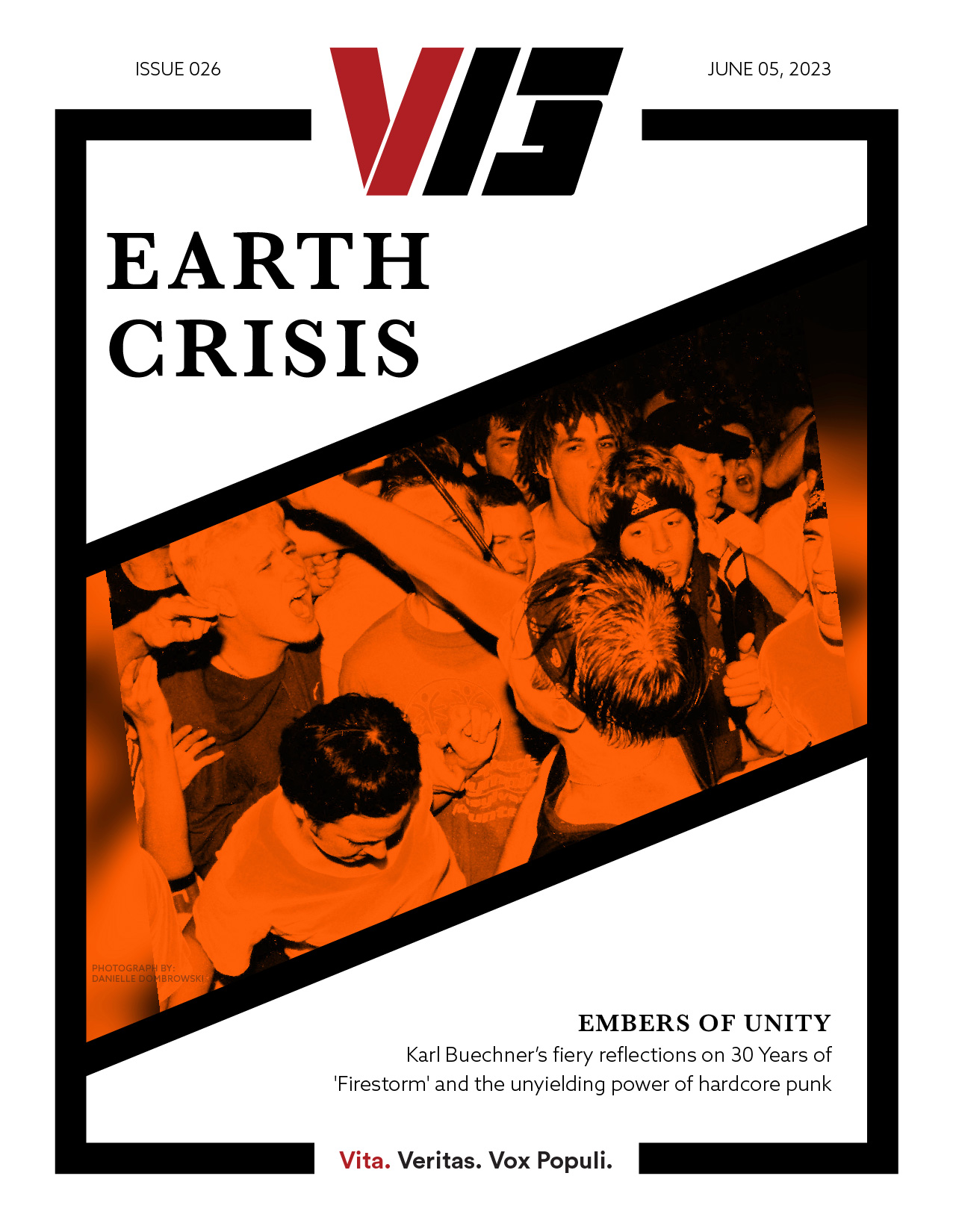
![Earth Crisis ‘Firestorm’ [EP] album artwork](https://v13.net/wp-content/uploads/earth_crisis_-_firestorm.jpg)
